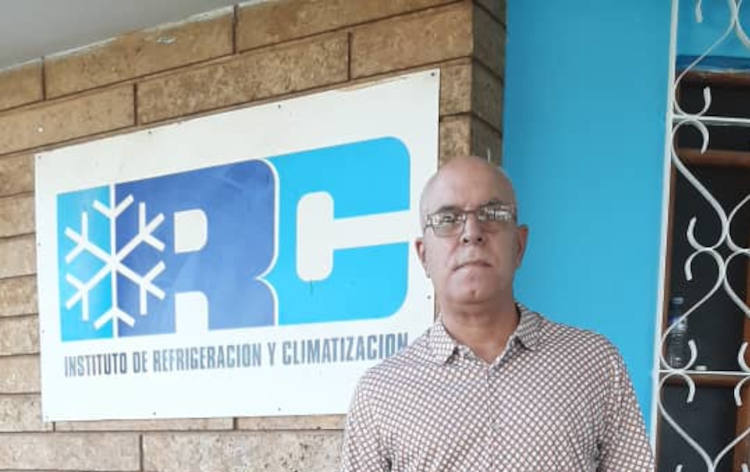-
25 February 2021
Category : Interview
“The programme has enabled us to deepen of our expertise in energy efficiency”
In this interview, José R. Rojo Rodríguez, General Director of the Institute of Refrigeration and Air Conditioning of Cuba, tells us about the importance of the IRC and the cooperation work which they have been carrying out together with the EU-Cuba Facility for Expertise Exchanges II, funded by the European Union and managed by FIIAPP
 José R. Rojo Rodríguez, General Director of the Cuban Institute of Refrigeration and Air Conditioning
José R. Rojo Rodríguez, General Director of the Cuban Institute of Refrigeration and Air ConditioningWhat is the Institute of Refrigeration and Air Conditioning?
The Institute of Refrigeration and Air Conditioning (IRC) is a national reference centre for the refrigeration sector in Cuba. Our corporate purpose is to provide scientific-technological services, conducting applied research in matters of refrigeration, air conditioning and ventilation.
We have more than 40 years of experience providing specialised solutions in these areas, with a highly qualified professional staff that carries out projects that range from the project itself to the supplying and provision of specialised technical assistance, called “turnkey projects”.
What are your main areas of work?
Our main activity consists of services for science and technological innovation works, in the national territory and abroad, technical assistance, feasibility studies, surveys, diagnoses, knowledge management and technological management by applying new technologies. We also carry out tests on refrigeration and air conditioning equipment, to certify its quality and verify its energy efficiency, both for national and foreign legal entities, provided that the latter are domiciled, established or authorised to operate in the country.
At IRC we also organise training sessions, technical events, seminars and conferences on refrigeration, air conditioning and ventilation, and we carry out standardisation work, such as: development of quality specification standards, technical requirements and energy consumption rates and technological processes within these specialist areas, as well as marketing raw materials and idle materials.
Which IRC jobs would you highlight due to their relevance to energy efficiency in Cuba?
At IRC, we have experience in developing turnkey projects for refrigeration facilities for different products and in different locations in Cuba, among which are the following: the Frigorífico San Pedrito with three freezing tunnels, the Contramaestre refrigerator for citrus fruits, the refrigerator of the Mariel Special Development Zone and the Camarones de Guajaca processing plant.
We also have laboratories that certify the quality of the refrigeration and air conditioning equipment that Cuba produces or imports and we run several specialised courses in refrigeration and air conditioning that can also be taught online through the GESTA virtual platform, the Centre for Business Management, Technical and Administrative Achievement of the Ministry of Industries of Cuba.
How is the EU-Cuba Facility for Expertise Exchanges II Programme supporting this issue? Could you mention some specific activities?
IRC’s participation in the programme has enabled us to deepen our expertise along the lines of energy efficiency and the use of all residual energy sources. This has already made it possible to work on reducing energy consumption in facilities belonging to several organisations. Likewise, this experience and the knowledge acquired has multiplied and has reached more people through the courses given by our centre to all the personnel interested in these topics.
Support for the programme has been very important for us in facilitating the participation of 3 IRC specialists on a Master’s Degree in Energy Conversion Systems and Technologies, at the Rovira y Virgilio University of Tarragona, Spain, which has allowed us to raise the scientific level of our specialists. They are already preparing their final Master’s theses, which have also been linked to the issues we are working on with the EU-Cuba Facility for Expertise Exchanges II Programme.
Within the framework of the Programme and in relation to this Master’s Degree, what results do you hope to obtain from this training?
The participation of our specialists on the Master’s Degree will allow us to open new lines of work that will influence the use of residual energies to protect the environment and expand the use of renewable energies in refrigeration and air conditioning in our country.
The views and opinions expressed in this blog are the sole responsibility of the person who write them.




